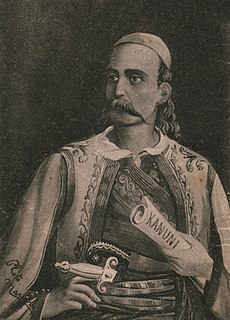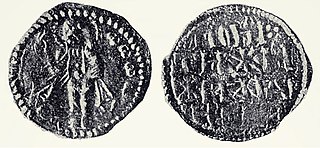 W
WAngelina Branković, née Arianiti, was the despotess consort of Serbian Despot Stefan Branković, and a daughter of Albanian nobleman Gjergj Arianiti. For her pious life she was proclaimed a saint and venerated as such by the Serbian Orthodox Church as Venerable Mother Angelina.
 W
WThe Bua were a medieval Albanian tribe. The name is first attested in 14th-century historical documents as one of the Albanian tribes living in the Despotate of Epirus. Later on, the Bua settled southwards in the Peloponnese, and a part of them found refuge in Italy in the Arbëreshë migrations that followed the Ottoman conquest of the Balkans. A branch of the tribe regiments was ennobled in the Holy Roman Empire after its service in the Stratioti, a Balkan mercenary unit. Mercurio Bua, its most prominent member, was Count of Aquino and Roccasecca.
 W
WLekë III Dukagjini (1410–1481), mostly known as Lekë Dukagjini, was a mysterious member of the Dukagjini family about whom little is known and who is thought to have been a 15th-century Albanian nobleman. A contemporary of Skanderbeg, Dukagjini is known for the Kanuni i Lekë Dukagjinit, a code of law instituted among the tribes of northern Albania.
 W
WMoisi Golemi, also known as Moisi of Dibra, was an Albanian nobleman and a commander of the League of Lezhë. In 1443–44 he captured all Ottoman holdings in the area of Dibër region. For a brief period in the 1450s he joined the Ottomans, but soon abandoned them and returned to the League. He died in 1464, when he was executed publicly in Constantinople after being captured by the Ottoman army. In Albanian folk tradition, Golemi became a popular hero mostly through the Song of Moisi Golemi.
 W
WAndrea Gropa was a 14th-century nobleman who ruled the region and the city of Ohrid, first as a minor vassal (župan) to Serbian King Vukašin Mrnjavčević, then as an Ottoman vassal after the Battle of Maritsa. He hailed from the noble Gropa family.
 W
WThe Matranga was an Albanian noble family during 13th and 15th centuries. Members of this family include local rulers, Byzantine officials and writers. After the occupation of Albania by the Ottoman Empire, part of the family emigrated to Italy and settled in the Arbëresh villages of Southern Italy, where they have continued to preserve the Albanian language.
 W
WThe Principality of Dukagjini refers to the domains (zotërimet) of the Albanian Dukagjini family in northern Albania and western Kosovo in the 14th century and 15th century. At their maximum extent, the domains of the Dukagjini extended from Upper Zadrima in the northwest to the Plain of Dukagjini in western Kosovo. The political center of the Dukagjini family was Lezhë until 1393 when it was surrendered to Venice in order to not fall under the Ottomans. The Ottoman sanjak of Dukagjin was named after the rule of the family in the areas that formed it.
 W
WThe Skuraj were an Albanian noble family that ruled over the region of nowadays Central Albania in the Late Middle Ages. Some scions of the family served in the Ottoman Empire administration. Among the most important figures of this family is mentioned the sevast Maurus Skurra, in 1274, who, in 1280, was given the title "count" by Charles of Anjou.